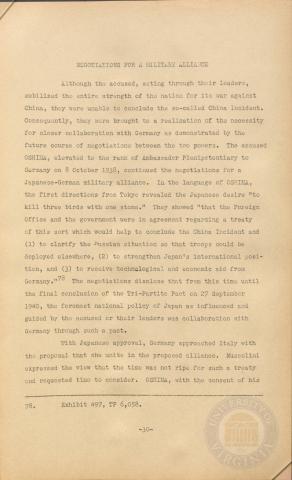
Page 30
| Parent | Japanese - German - Italian Collaboration |
|---|---|
| Date | |
| Language | English |
| Collection | Tavenner Papers & IMTFE Official Records |
| Box | Box 14 |
| Folder | Japan, Germany, Italy Collaboration and Introduction |
| Repository | University of Virginia Law Library |
NEGOTIATIONS FOR A MILITARY ALLIANCE
Although the accused, acting through their leaders, mobilized the entire strength of the nation for its war against China, they were unable to conclude the so-called China Incident. Consequently, they were brought to a realization of the necessity for closer collaboration with Germany as demonstrated by the future course of negotiations between the two powers. The accused OSHIMA, elevated to the rank of Ambassador Plenipotentiary to Germany on 8 October 1938, continued the negotiations for a Japanese-German military alliance. In the language of OSHIMA, the first directions from Tokyo revealed the Japanese desire "to kill three birds with one stone." They showed "that the Foreign Office and the government were in agreement regarding a treaty of this sort which would help to conclude the China Incident and (1) to clarify the Russian situation so that troops could be deployed elsewhere, (2) to strengthen Japan!s international posi¬tion, and (3) to receive technological and economic aid from
Germany."78 The negotiations disclose that from this time until the final conclusion of the Tri-Partite Pact on 27 September 1940, the foremost national policy of Japan as influenced and guided by the accused or their leaders was collaboration with Germany through such a pact.
With Japanese approval, Germany approached Italy with the.proposal that she unite in the proposed alliance, Mussolini expressed the view that the time was not ripe for such a treaty and requested time to consider. OSHIMA, with the consent of his
78Exhibit 497, TP 6,0?8.
